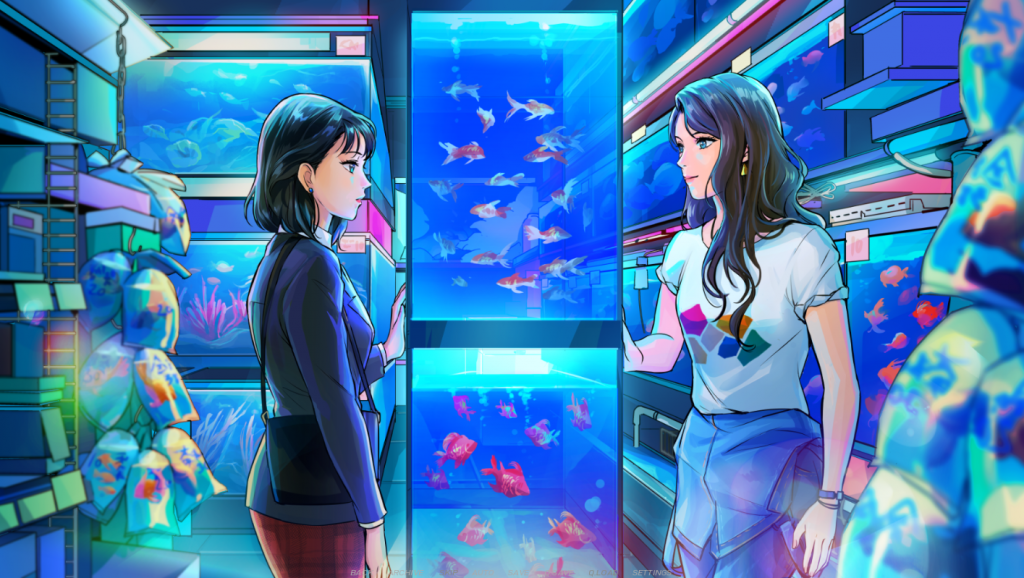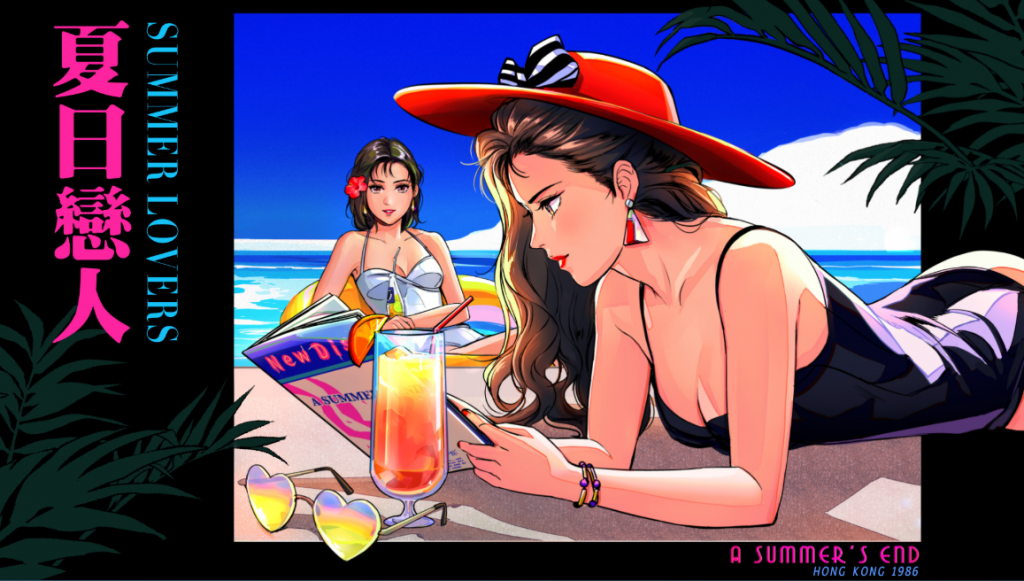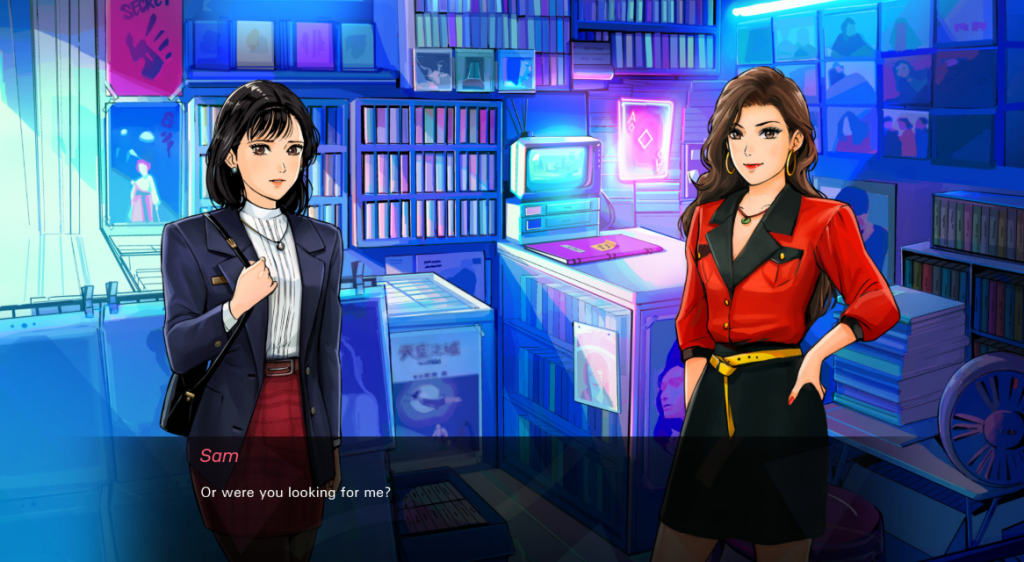
A Summer’s End: What It Means To Release A Queer Hong Kong Game In 2020

Lesbians are like biker jackets; most people accept that they exist, though some would never be seen in public with one. They’re often oversexualised and fetishised in fiction, and taking one to an elegant restaurant in some corners of the world will still draw a gasp. Queer stories have an unmistakable hint of rebellion to them, and A Summer’s End, a new visual novel from Oracle & Bone Studio, typifies that. Set in the decade for biker jackets – the glamorous 1980s – it details the romance between Michelle and Sam.
There’s a lot to love about the game, but perhaps the most intriguing aspect of A Summer’s End isn’t the time, but the place: Hong Kong.
The demonstrations for democracy in Hong Kong became one of the biggest stories of our era last year, with the protesters repurposing the Pepe meme, rampant police brutality and the controversial use of face recognition technology (and the various ingenious ways of combating it) all becoming major news stories off the back of the central story: the protests themselves. They began in June over China’s extradition bill, which would give the Chinese state greater influence over Hong Kong. The bill was withdrawn by September, but the demonstrations continued, seeking amnesty for those arrested, an inquiry into police brutality and universal suffrage.
For the generation raised by computers, it’s easy to see why the protests, demonstrating the power of the people and fuelled by memes, stuck a chord. As A Summer’s End developers Charissa So & Tida Kietsungden stressed however, 2019 was not Hong Kong’s first foray into geopolitics. “The existential identity of Hong Kong is something that has been long politicized,” they told me, noting how other art from the region, cinema in particular, has long been influenced by politics. “A topic of much exploration in ‘80s & ‘90s Hong Kong cinema is the question of identity pre and post 1997: the year Hong Kong transferred its sovereignty from colonial British rule to mainland China. When we started working on A Summer’s End in 2018, we had these themes in mind and wanted to reflect on them in our own project.”

Between starting work on the game and releasing it however, the demonstrations for democracy erupted, and as So and Kietsungden explained, that forced them to examine the setting – and what it could mean – much more precisely.
“In the initial phases of development, we wanted to mainly focus on the romance aspect of the game and on portraying the Asian LGBTQ experience. As the political situation evolved in Hong Kong with mass demonstrations taking place against a controversial extradition bill in 2019, we knew we had to be even more conscious of the themes and messages our game might come to represent.”
The 1997 Handover is complex issue. In short, it saw the United Kingdom relinquish control of Hong Kong and hand it back to the Chinese government, effectively ending the British Empire. While the retreat of colonisers seems, on paper, to be a net positive, China taking control was not universally welcomed. It left many feeling they would exert authority more forcefully, and would threaten the freedoms of Hong Kong; something June’s extradition bill appears to support.
A Summer’s End takes influence from one of Hong Kong’s most divisive eras – described by the developers as “a culturally unique period of history” – and was born in the most volatile time the region has seen. These themes have had a clear influence on the game. “The sense of dread and heaviness with the topic of the 1997 handover was something we wanted to present in the game as it was a very real issue that impacted the lives of Hong Kong people during that time and even till now.”
Ultimately though, A Summer’s End is a game of hope, as So and Kietsungden stressed, “like butterflies, our lives are short in the grand scheme of things. The love that we have might only be for a moment in this world that is so uncertain and unstable, but what we wanted to show in this story is that even in this short moment, we should have the ability to decide for ourselves what is best for own lives.”

As well as the pressures of showcasing a setting as complex as Hong Kong, So and Kietsungden were also highly aware of the history of fetishisation of both lesbians and Asians in romance fiction.
“We were cognizant of such tropes and stereotypes as LBGTQ Asian creators ourselves. Much of this game is influenced in part from personal experiences and from other people’s personal accounts; we wanted to approach this topic as sensitively and as authentically as we could.”
Hong Kong is its own character in the story, and one of increased importance given the current political landscape. However, Michelle and Sam tell a powerful story on their own, and represent queer narratives often ignored in fiction. “We wanted to represent the Asian LGBTQ experience as authentically as we could in this game,” So and Kietsungden said. “Our experiences are unique across cultures and it is important to represent them frankly and unabashed.”
Despite the importance of Hong Kong to Michelle and Sam’s story though, at it’s heart, A Summer’s End offers a universal truth, “We all deserve to live with dignity and pride and to have a voice in the society we share, whether in Hong Kong or anywhere. We really hope this reality can be achieved for everyone. If there is a real Michelle and Sam alive in the world right now, we hope they are living their best and most fulfilled life in safety and security.”
You can purchase A Summer’s End – Hong Kong 1986 right now on Steam.





